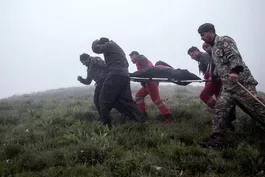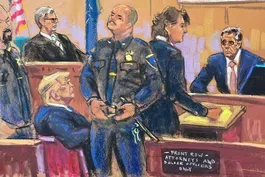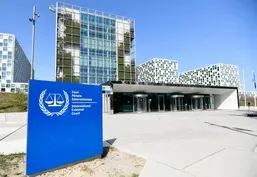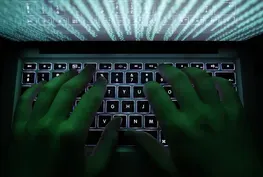
Tamara Keith and Amy Walter on GOP leaders at Trump's trial
Clip: 5/20/2024 | 8m 52sVideo has Closed Captions
Tamara Keith and Amy Walter on Republicans rallying around Trump at his trial
NPR’s Tamara Keith and Amy Walter of the Cook Political Report with Amy Walter join Geoff Bennett to discuss the latest political news, including Republican allies continue to make appearances at the courthouse to show their support for Trump and why Democrats wanted an early presidential debate.
Problems with Closed Captions? Closed Captioning Feedback
Problems with Closed Captions? Closed Captioning Feedback
Major corporate funding for the PBS News Hour is provided by BDO, BNSF, Consumer Cellular, American Cruise Lines, and Raymond James. Funding for the PBS NewsHour Weekend is provided by...

Tamara Keith and Amy Walter on GOP leaders at Trump's trial
Clip: 5/20/2024 | 8m 52sVideo has Closed Captions
NPR’s Tamara Keith and Amy Walter of the Cook Political Report with Amy Walter join Geoff Bennett to discuss the latest political news, including Republican allies continue to make appearances at the courthouse to show their support for Trump and why Democrats wanted an early presidential debate.
Problems with Closed Captions? Closed Captioning Feedback
How to Watch PBS News Hour
PBS News Hour is available to stream on pbs.org and the free PBS App, available on iPhone, Apple TV, Android TV, Android smartphones, Amazon Fire TV, Amazon Fire Tablet, Roku, Samsung Smart TV, and Vizio.
Providing Support for PBS.org
Learn Moreabout PBS online sponsorshipGEOFF BENNETT: As Donald Trump's criminal hush money trial nears its conclusion, high-profile Republican supporters continue to make appearances to the New York City courthouse to show their support for the former president.
Is this the new litmus test for GOP candidates?
One of the questions for our Politics Monday team.
That's Amy Walter of The Cook Political Report With Amy Walter and Tamara Keith of NPR.
Great to see you both.
So let's start there, Tam, with this stream of GOP elected leaders who have been making this pilgrimage to this New York City courthouse to speak out in support of Donald Trump.
What should we make of this?
These leaders, these elected leaders, say that they're there to speak on behalf of Mr. Trump because he can't speak on his own behalf because of his gag order.
TAMARA KEITH, National Public Radio: And they are delivering the message that the former president wants to have delivered, a message that, both with their presence and with their words is saying, this trial isn't serious.
This trial is a witch-hunt or a Democratic prosecutor run amok.
By making that pilgrimage up there, often dressed in the Trump uniform, they are standing behind him quite literally and signaling certainly to Republican base voters, it's OK. You don't need to worry about this thing no matter how it turns out.
This is fine.
Don't worry.
GEOFF BENNETT: And, Amy, Speaker Mike Johnson's appearance is notable, I think, given the constitutional heft of his office.
And by being there, he is effectively leveraging his speakership and all of the symbolic weight and significance that carries against the justice system.
AMY WALTER, The Cook Political Report: Yes, although I would argue, Geoff, that really what he's trying to do by going there and showing his support is actually trying to keep his own job.
We know the role that Donald Trump can play in keeping the fractious Republican Party together.
And, in fact, he was pretty much responsible for making sure that Congresswoman Marjorie Taylor Greene's call to oust Mike Johnson failed.
He put out on TRUTH Social that she's really great and everything, but now's the time for us to come together.
Don't vote to oust the speaker.
But he had a very important note at the very end of that missive where he said, we may -- at some point, it may -- very well may be the case that he needs to be ousted.
That is not now.
So, ultimately, if you're Mike Johnson, you know that literally every day your ability to keep your job depends on getting the support of the former president.
GEOFF BENNETT: And, at the same time, the so-called big lie about the 2020 election has now become this big litmus test for Republicans.
And it's expanded to their willingness to accept the results of the 2024 election.
Congressman -- rather, Senator Marco Rubio, said to be a Trump V.P.
hopeful, was on "Meet the Press" yesterday, and he wouldn't accept or wouldn't commit to accepting the 2024 results.
KRISTEN WELKER, Moderator, "Meet the Press": Will you accept the election results of 2024 no matter what happens, Senator?
SEN. MARCO RUBIO (R-FL): No matter what happens?
No, if it's an unfair election, I think it's going to be contested by either side.
KRISTEN WELKER: No matter who wins?
Senator, no matter who wins?
SEN. MARCO RUBIO: Well, why don't you -- I think you're asking the wrong person.
The Democrats are the ones that have opposed every Republican victory since 2000, every single one.
GEOFF BENNETT: And he's not the only one.
Senator Tim Scott would also not commit to accepting the results of the 2024 election.
This has very much become party orthodoxy now.
TAMARA KEITH: And this is very similar to language that many Republicans, including Mike Pence, landed on after the 2020 election and before January 6, where they didn't want to go all the way as far as Trump is going and say that the election was stolen, but they wanted to say, well, you should look into it.
And what they're saying here is, well, we will support the results if it's a fair election.
But it's worth noting that former President Trump really only thinks an election is fair if he wins.
And I will just remind you that, after 2016, he won, and then he claimed that there was election - - there was voter fraud in California and New Hampshire because he didn't win those states.
So he is someone who has a very lengthy, proven track record of denying election results.
And now you have Republicans out there, mainstream Republicans, creating sort of a permission structure, saying that, if it's fair, then maybe I will support the results.
They're not willing to commit in advance.
And that creates a permission structure for mainstream Republican voters to say, well, if they're OK with this, then I can be OK with this.
GEOFF BENNETT: And, Amy, we know how damaging this denialism is for our democracy.
How does it play politically?
I mean, is there political utility in Republicans rallying around this issue?
What does it do for moderate Republicans or independent voters, who are going to be the swing deciders in this election?
AMY WALTER: When you see folks like Marco Rubio or those other candidates you discussed going on TV and answering questions like this, they really aren't speaking to voters.
They're speaking to an audience of one.
And that is Donald Trump.
Many of them are essentially in tryouts to be the vice president.
What we know about this president, it's always been the case, but I think it has even ratcheted up in the most recent time period, that he looks for loyalty above all else, and especially in his vice president, the person who will be with him if he gets back to the White House.
He wants to make sure that, no matter what, this person is going to stand with him.
And I think we're going to see similar loyalty tests all the way down to any office that would get filled by a political appointee, should Donald Trump win election to a second term.
GEOFF BENNETT: Let's talk about the debates, because I think that news broke last Wednesday.
It was after we had a chance to speak with you both last Monday.
We have got the first scheduled debate now just six weeks away.
It's going to happen in June on CNN.
The rival campaigns have skirted around the Commission on Presidential Debates.
Tam, what's the risk/reward calculus for both sides here, having this debate in a studio, no audience?
TAMARA KEITH: So both Trump and his team and Biden and his team think that his opponent cannot stand there for 90 minutes and conduct a debate without embarrassing themselves, falling asleep, slurring their words.
You name it, they think that their opponents are incapable of going into a debate.
So that is part of the calculus on both sides.
What I will say is that, on the Biden side, I have spoken to people close to the Biden campaign.
They really believe, and they have been saying this for months, that people are not focused on this campaign.
And so when Trump said any time, anywhere, they said, let's do it in June, because we want people to start paying attention to the choice and being aware of the stakes in the election.
That's the theory that the Biden campaign is operating under, is that their numbers will improve if people realize that, yes, in fact, Joe Biden and Donald Trump are the candidates.
And so they're trying to jump ahead of the conventions, which would be a traditional time when people would become more aware of the election.
GEOFF BENNETT: Amy, how do you see it?
And is June too early for a debate that will matter?
AMY WALTER: I think that if you're the Biden campaign, as Tam pointed out, it's not too early.
You need to shake this race up.
I think, if anything, what -- the decision by the Biden campaign to accept this debate suggests that they know that they are running behind, or at least not in the position they want to be for an incumbent president.
They need to turn this election from one that's a referendum on Biden to one that's a choice between Biden and Trump.
The risk, of course, is that either it doesn't work, and now it's June, the numbers don't move very much, and the president goes into his convention a few weeks later with an even more depressed and anxious base of voters, and Trump is able to go into his convention with a lot of wind at his back.
So there is, I think, a very big risk for Biden here that it doesn't go as planned.
But if the Biden campaign, as Tam pointed out, their entire theory of the case is that this has to be made clear that it is a choice, that choice has to be put in front of voters as quickly as possible and as often as possible.
GEOFF BENNETT: All right, Amy Walter and Tamara Keith, thank you both, as always.
TAMARA KEITH: You're welcome.
AMY WALTER: You're welcome.
Can the ICC arrest Israeli, Hamas leaders? Experts weigh in
Video has Closed Captions
Clip: 5/20/2024 | 6m 49s | Can the ICC arrest Israeli and Hamas leaders for war crimes? Legal experts weigh in (6m 49s)
Deaths leave Iran without key leadership at crucial moment
Video has Closed Captions
Clip: 5/20/2024 | 9m 15s | Raisi's death leaves Iran without key leadership at crucial moment for Middle East (9m 15s)
How Trump’s legal team is trying to ruin Cohen's credibility
Video has Closed Captions
Clip: 5/20/2024 | 4m 55s | How Trump’s legal team is trying to ruin Michael Cohen's credibility in hush money trial (4m 55s)
ICC seeks war crimes charges for Israeli and Hamas leaders
Video has Closed Captions
Clip: 5/20/2024 | 2m 58s | International Criminal Court seeks war crimes charges for Israeli and Hamas leaders (2m 58s)
Lorraine O'Grady on her long path into art world acceptance
Video has Closed Captions
Clip: 5/20/2024 | 6m 37s | Acclaimed artist Lorraine O'Grady on her long path into art world acceptance (6m 37s)
Rapid AI advancements spark wonder and concern
Video has Closed Captions
Clip: 5/20/2024 | 7m 10s | Tech companies unveil rapid AI advancements, sparking wonder and concern (7m 10s)
Providing Support for PBS.org
Learn Moreabout PBS online sponsorshipSupport for PBS provided by:
Major corporate funding for the PBS News Hour is provided by BDO, BNSF, Consumer Cellular, American Cruise Lines, and Raymond James. Funding for the PBS NewsHour Weekend is provided by...

















